高考英语倒装句大总结
- 格式:doc
- 大小:1.04 MB
- 文档页数:5
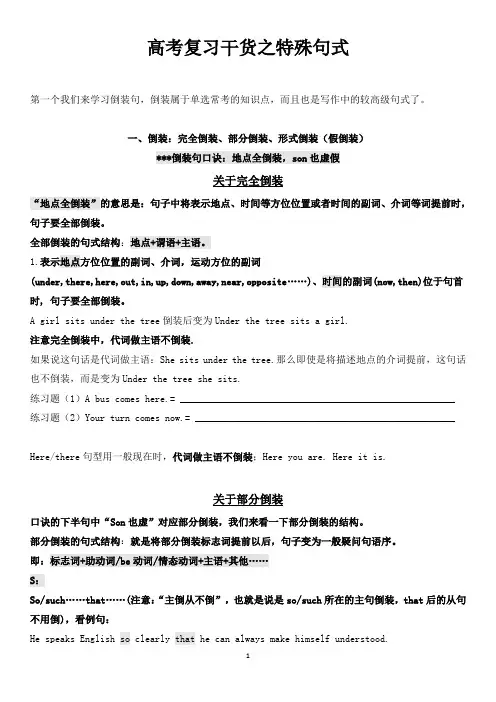
第一个我们来学习倒装句,倒装属于单选常考的知识点,而且也是写作中的较高级句式了。
一、倒装:完全倒装、部分倒装、形式倒装(假倒装)***倒装句口诀:地点全倒装,son也虚假关于完全倒装“地点全倒装”的意思是:句子中将表示地点、时间等方位位置或者时间的副词、介词等词提前时,句子要全部倒装。
全部倒装的句式结构:地点+谓语+主语。
1.表示地点方位位置的副词、介词,运动方位的副词(under,there,here,out,in,up,down,away,near,opposite……)、时间的副词(now,then)位于句首时, 句子要全部倒装。
A girl sits under the tree倒装后变为Under the tree sits a girl.注意完全倒装中,代词做主语不倒装.如果说这句话是代词做主语:She sits under the tree.那么即使是将描述地点的介词提前,这句话也不倒装,而是变为Under the tree she sits.练习题(1)A bus comes here.= _______________________________________________________ 练习题(2)Your turn comes now.= ____________________________________________________Here/there句型用一般现在时,代词做主语不倒装;Here you are. Here it is.关于部分倒装口诀的下半句中“S on也虚”对应部分倒装,我们来看一下部分倒装的结构。
部分倒装的句式结构:就是将部分倒装标志词提前以后,句子变为一般疑问句语序。
即:标志词+助动词/be动词/情态动词+主语+其他……S:So/such……that……(注意:“主倒从不倒”,也就是说是so/such所在的主句倒装,that后的从句不用倒),看例句:He speaks English so clearly that he can always make himself understood.=so是标志词,所以so clearly这个意群提前(举个例子来说意群:一辆出租车来了=来了一辆出租车,其中“一辆出租车”这几个字不能拆分,它就是一个意群),然后再将主句调整为上边说的部分倒装句式结构。
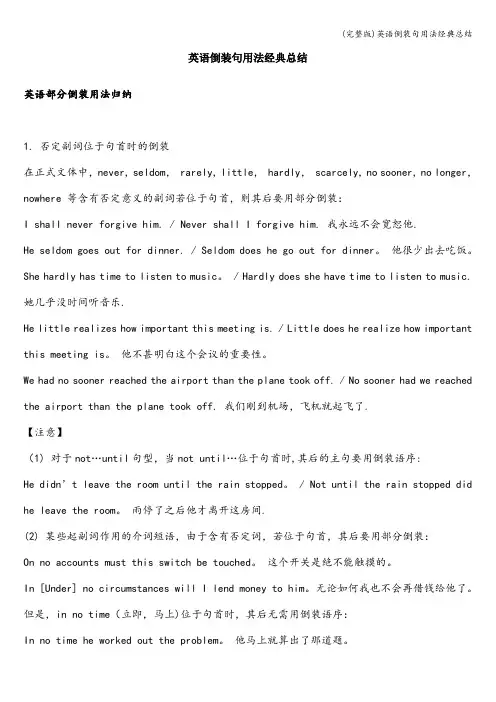
英语倒装句用法经典总结英语部分倒装用法归纳1. 否定副词位于句首时的倒装在正式文体中,never, seldom, rarely, little, hardly, scarcely, no sooner, no longer,nowhere 等含有否定意义的副词若位于句首,则其后要用部分倒装:I shall never forgive him. / Never shall I forgive him. 我永远不会宽恕他.He seldom goes out for dinner. / Seldom does he go out for dinner。
他很少出去吃饭。
She hardly has time to listen to music。
/ Hardly does she have time to listen to music. 她几乎没时间听音乐.He little realizes how important this meeting is. / Little does he realize how important this meeting is。
他不甚明白这个会议的重要性。
We had no sooner reached the airport than the plane took off. / No sooner had we reached the airport than the plane took off. 我们刚到机场,飞机就起飞了.【注意】(1) 对于not…until句型,当not until…位于句首时,其后的主句要用倒装语序:He didn’t leave the room until the rain stopped。
/ Not until the rain stopped did he leave the room。
雨停了之后他才离开这房间.(2) 某些起副词作用的介词短语,由于含有否定词,若位于句首,其后要用部分倒装:On no accounts must this switch be touched。
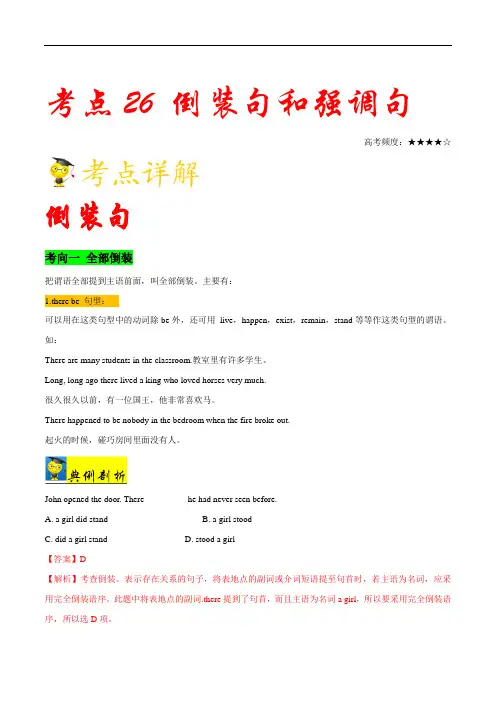
考点26 倒装句和强调句高考频度:★★★★☆倒装句考向一全部倒装把谓语全部提到主语前面,叫全部倒装。
主要有:1.there be 句型:可以用在这类句型中的动词除be外,还可用live,happen,exist,remain,stand等等作这类句型的谓语。
如:There are many students in the classroom.教室里有许多学生。
Long, long ago there lived a king who loved horses very much.很久很久以前,有一位国王,他非常喜欢马。
There happened to be nobody in the bedroom when the fire broke out.起火的时候,碰巧房间里面没有人。
John opened the door. There _________ he had never seen before.A. a girl did standB. a girl stoodC. did a girl standD. stood a girl【答案】D【解析】考查倒装。
表示存在关系的句子,将表地点的副词或介词短语提至句首时,若主语为名词,应采用完全倒装语序。
此题中将表地点的副词.there提到了句首,而且主语为名词a girl,所以要采用完全倒装语序,所以选D项。
2.Here/There/Now+vi.(常为come, go)+主语(必须是名词)此句型中here/there用来唤起注意意思是"喂,注意了"。
如:Here comes Mary. → I can see Mary coming.玛丽来了。
There goes the bell. 铃响了。
→I can hear the bell ringing.Here comes the bus.汽车来了。
There he comes.他来了。
这种句型不能用现在进行时。
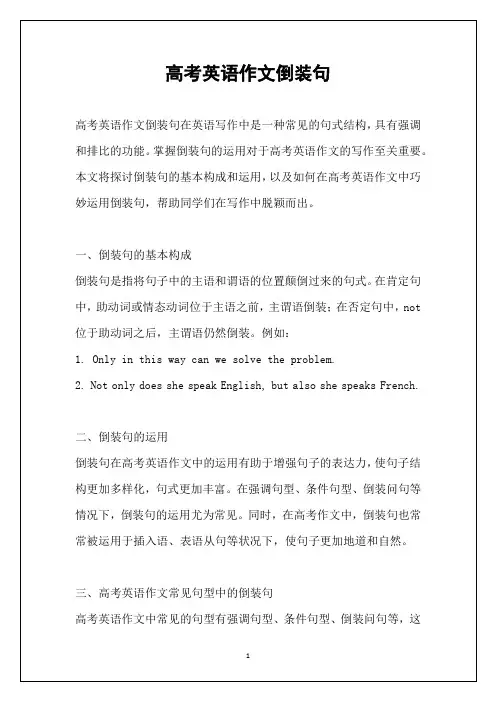
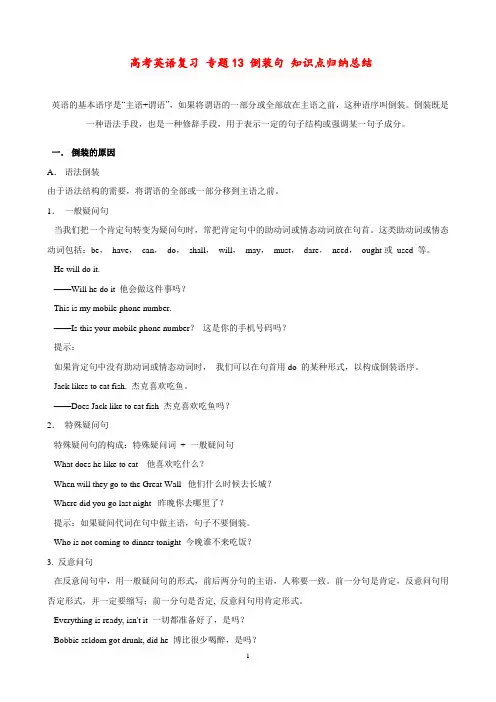
高考英语复习专题13 倒装句知识点归纳总结英语的基本语序是“主语+谓语”,如果将谓语的一部分或全部放在主语之前,这种语序叫倒装。
倒装既是一种语法手段,也是一种修辞手段,用于表示一定的句子结构或强调某一句子成分。
一.倒装的原因A.语法倒装由于语法结构的需要,将谓语的全部或一部分移到主语之前。
1.一般疑问句当我们把一个肯定句转变为疑问句时,常把肯定句中的助动词或情态动词放在句首。
这类助动词或情态动词包括:be,have,can,do,shall,will,may,must,dare,need,ought或used 等。
He will do it.——Will he do it 他会做这件事吗?This is my mobile phone number.——Is this your mobile phone number?这是你的手机号码吗?提示:如果肯定句中没有助动词或情态动词时,我们可以在句首用do 的某种形式,以构成倒装语序。
Jack likes to eat fish. 杰克喜欢吃鱼。
——Does Jack like to eat fish 杰克喜欢吃鱼吗?2.特殊疑问句特殊疑问句的构成:特殊疑问词+ 一般疑问句What does he like to eat 他喜欢吃什么?When will they go to the Great Wall 他们什么时候去长城?Where did you go last night 昨晚你去哪里了?提示:如果疑问代词在句中做主语,句子不要倒装。
Who is not coming to dinner tonight 今晚谁不来吃饭?3. 反意问句在反意问句中,用一般疑问句的形式,前后两分句的主语,人称要一致。
前一分句是肯定,反意问句用否定形式,并一定要缩写;前一分句是否定, 反意问句用肯定形式。
Everything is ready, isn't it 一切都准备好了,是吗?Bobbie seldom got drunk, did he 博比很少喝醉,是吗?You had a wonderful time last night, didn't you 昨天晚上你玩得很愉快,是吗?4.感叹句英语中的感叹句有时也通过倒装的形式来表达。
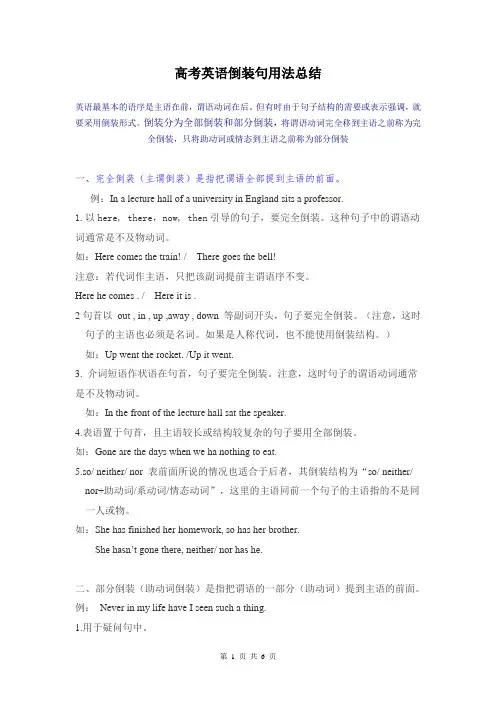
高考英语倒装句用法总结英语最基本的语序是主语在前,谓语动词在后。
但有时由于句子结构的需要或表示强调,就要采用倒装形式。
倒装分为全部倒装和部分倒装,将谓语动词完全移到主语之前称为完全倒装,只将助动词或情态到主语之前称为部分倒装一、完全倒装(主谓倒装)是指把谓语全部提到主语的前面。
例:In a lecture hall of a university in England sits a professor.1.以here, there,now, then引导的句子,要完全倒装。
这种句子中的谓语动词通常是不及物动词。
如:Here comes the train! / There goes the bell!注意:若代词作主语,只把该副词提前主谓语序不变。
Here he comes . / Here it is .2句首以out , in , up ,away , down 等副词开头,句子要完全倒装。
(注意,这时句子的主语也必须是名词。
如果是人称代词,也不能使用倒装结构。
)如:Up went the rocket. /Up it went.3. 介词短语作状语在句首,句子要完全倒装。
注意,这时句子的谓语动词通常是不及物动词。
如:In the front of the lecture hall sat the speaker.4.表语置于句首,且主语较长或结构较复杂的句子要用全部倒装。
如:Gone are the days when we ha nothing to eat.5.so/ neither/ nor 表前面所说的情况也适合于后者,其倒装结构为“so/ neither/ nor+助动词/系动词/情态动词”,这里的主语同前一个句子的主语指的不是同一人或物。
如:She has finished her homework, so has her brother.She hasn’t gone there, neither/ nor has he.二、部分倒装(助动词倒装)是指把谓语的一部分(助动词)提到主语的前面。
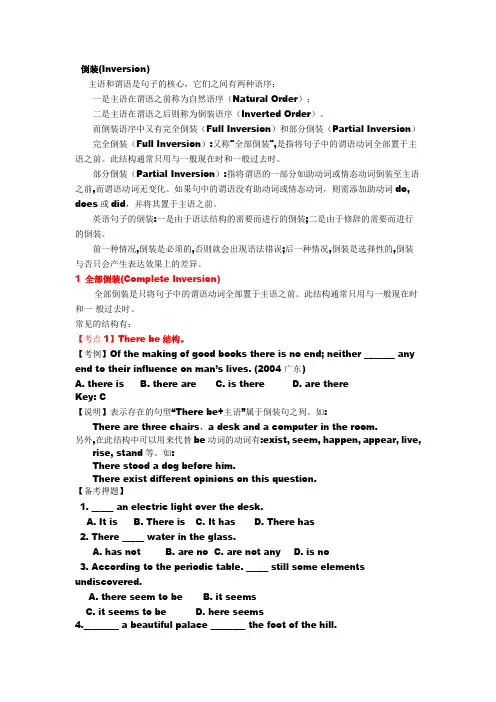
倒装(Inversion)主语和谓语是句子的核心,它们之间有两种语序:一是主语在谓语之前称为自然语序(Natural Order);二是主语在谓语之后则称为倒装语序(Inverted Order)。
而倒装语序中又有完全倒装(Full Inversion)和部分倒装(Partial Inversion)完全倒装(Full Inversion):又称"全部倒装",是指将句子中的谓语动词全部置于主语之前。
此结构通常只用与一般现在时和一般过去时。
部分倒装(Partial Inversion):指将谓语的一部分如助动词或情态动词倒装至主语之前,而谓语动词无变化。
如果句中的谓语没有助动词或情态动词,则需添加助动词do, does或did,并将其置于主语之前。
英语句子的倒装:一是由于语法结构的需要而进行的倒装;二是由于修辞的需要而进行的倒装。
前一种情况,倒装是必须的,否则就会出现语法错误;后一种情况,倒装是选择性的,倒装与否只会产生表达效果上的差异。
1 全部倒装(Complete Inversion)全部倒装是只将句子中的谓语动词全部置于主语之前。
此结构通常只用与一般现在时和一般过去时。
常见的结构有:【考点1】There be结构。
【考例】Of the making of good books there is no end; neither _______ any end to their influence on man’s lives. (2004广东)A. there isB. there areC. is thereD. are thereKey: C【说明】表示存在的句型“There be+主语”属于倒装句之列。
如:There are three chairs,a desk and a computer in the room.另外,在此结构中可以用来代替be动词的动词有:exist, seem, happen, appear, live, rise, stand等。
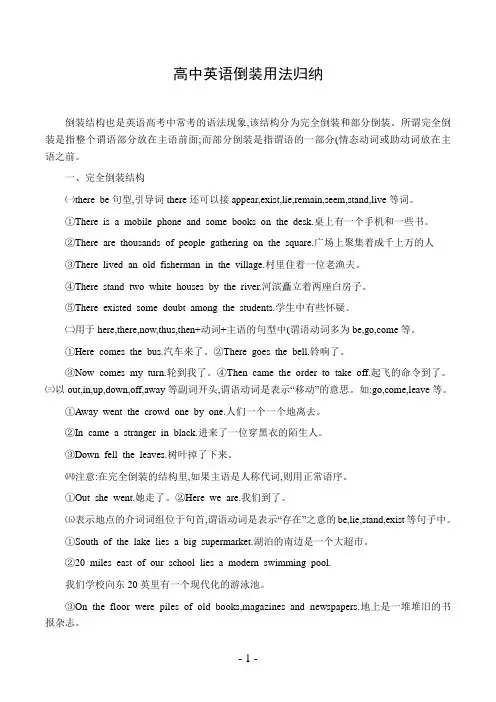
高中英语倒装用法归纳倒装结构也是英语高考中常考的语法现象,该结构分为完全倒装和部分倒装。
所谓完全倒装是指整个谓语部分放在主语前面;而部分倒装是指谓语的一部分(情态动词或助动词放在主语之前。
一、完全倒装结构㈠there be句型,引导词there还可以接appear,exist,lie,remain,seem,stand,live等词。
①There is a mobile phone and some books on the desk.桌上有一个手机和一些书。
②There are thousands of people gathering on the square.广场上聚集着成千上万的人③There lived an old fisherman in the village.村里住着一位老渔夫。
④There stand two white houses by the river.河滨矗立着两座白房子。
⑤There existed some doubt among the students.学生中有些怀疑。
㈡用于here,there,now,thus,then+动词+主语的句型中(谓语动词多为be,go,come等。
①Here comes the bus.汽车来了。
②There goes the bell.铃响了。
③Now comes my turn.轮到我了。
④Then came the order to take off.起飞的命令到了。
㈢以out,in,up,down,off,away等副词开头,谓语动词是表示“移动”的意思。
如:go,come,leave等。
①Away went the crowd one by one.人们一个一个地离去。
②In came a stranger in black.进来了一位穿黑衣的陌生人。
③Down fell the leaves.树叶掉了下来。
㈣注意:在完全倒装的结构里,如果主语是人称代词,则用正常语序。
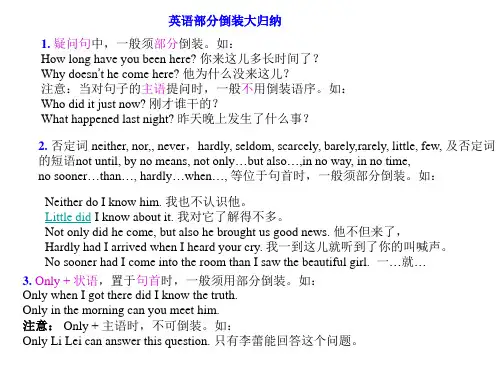
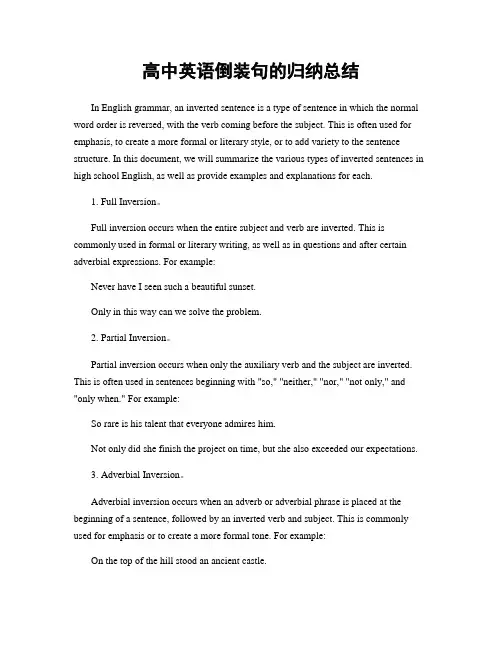
高中英语倒装句的归纳总结In English grammar, an inverted sentence is a type of sentence in which the normal word order is reversed, with the verb coming before the subject. This is often used for emphasis, to create a more formal or literary style, or to add variety to the sentence structure. In this document, we will summarize the various types of inverted sentences in high school English, as well as provide examples and explanations for each.1. Full Inversion。
Full inversion occurs when the entire subject and verb are inverted. This is commonly used in formal or literary writing, as well as in questions and after certain adverbial expressions. For example:Never have I seen such a beautiful sunset.Only in this way can we solve the problem.2. Partial Inversion。
Partial inversion occurs when only the auxiliary verb and the subject are inverted. This is often used in sentences beginning with "so," "neither," "nor," "not only," and "only when." For example:So rare is his talent that everyone admires him.Not only did she finish the project on time, but she also exceeded our expectations.3. Adverbial Inversion。

倒装句作为高考中必考的语法之一,也因为其自身的特殊结构,复杂的倒装条件让学生们很难高效掌握,这也是高中英语语法知识中的难点。
因此,为了更好地解决问题,本文针对性地从例题入手,让同学们明确在高考中的倒装句考哪些,具体怎么考,更好地提升同学们的学习效
一、倒装句的本质结构以及特点
倒装的本质是语序上的问题,主要是词组组合的顺序,
(1)将否定副词 never、seldom
scarcely、nowhere 等置于句首时,其后引出部分倒装。
例如:Never has there been such an effort to save whales from extinction. 如此抢救鲸鱼,以使其免于灭绝,是以前从来没有过的。
(2)将no sooner...than... 结构中的
时,其后引出部分倒装。
例如:No sooner had we reached the
airport than the plane took off.我们刚到机场,飞机就起飞了。
(3)将not...until...结构中的not...
后引出部分倒装。
例如:Not until I had read your letter did I
高考英语中常见的四种倒装结构
●南昌市雷式学校 郑文琴 贺 莹。
高考英语倒装句知识点全集汇编附解析一、选择题1.—How can I live my dreams in a short time?—Be practical. Between you and your dreams ________ a lot of hard work.A.stand B.standsC.is standing D.are standing2.Not only my oral spoken English but also some customs in Western countries.A.I can improve; I can learn B.can I improve; I can learnC.I can improve; can I learn D.can I improve; can I learn3.Nowhere else in the world ________ such a quiet beautiful place.A.can you find B.you can findC.had you found D.you had found4.As is shown in the movie, under no circumstances __________ faith and confidence.A.you should lose B.shouldn’t you haveC.should you lose D.you shouldn’t lose5.Only when he reached the teahouse it was the same place he’d been in last year.A.he realized B.realized he C.had he realized D.did he realize 6.Mum is coming. What present________ for your birthday?A.you expect she has gotB.you expect has she gotC.do you expect she has gotD.do you expect has she got7.Only with a reasonable examination system _____ pick out _____ we think is qualified for the task.A.we can; any who B.can we; whoever C.we can; anyone D.can we; who8., he talks a lot about his favorite singers after class.A.A quiet student as he may B.Quiet student as he may beC.Be a quiet student as he may D.Quiet as he may be a student9.______ on mobile phones for storing information that people are unable to remember basic things.A.Such is the dependence B.Such dependence doesC.So they are dependent D.So do they depend10.—With this New Year_______ new challenges.一Sure. Global economy remains uncertain, and many countries continue to struggle. A.comes B.will comeC.is coming D.come11.Along with enthusiasm for composing music ______ his devotion to cultivating young people passionate about music.A.come B.comes C.coming D.to come12.Only when he reached the tea-house _________ it was the same place he’d been in last year.A.he realized B.he did realizeC.realized he D.did he realize13.He went to the cinema yesterday and ______.A.so did his sister B.so his sister did C.so was his sister D.so his sister was 14.Only when the circuit breaker mechanism was triggered________what a negative impact the epidemic had made on the country’s economy.A.had they realized B.they realized C.they realize D.did they realize 15.If John goes to the concert, so _____ his wife.A.does B.did C.would D.will16.Mable is very weak, so the doctor advised that not only ______ more flood, but she should also take more exercise.A.should she have B.she should have C.she has D.has she17.Out to the finishing line…! And here !A.he dashes… comes our champion and heroB.dashes he… our champion and hero comeC.he dashes… come our champion and heroD.dashes he… comes our champion and hero18.______, his ideas was accepted by all the people at the meeting.A.Strange as might it sound B.As it might sound strangeC.As strange it might sound D.Strange as it might sound19.Along with enthusiasm for composing music _________ his devotion to cultivating young people's passion for music.A.come B.comes C.coming D.to come20.Out of suffering _________.A.have emerged the strongest souls B.emerged the strongest souls haveC.have the strongest souls emerged D.the strongest souls have emerged 21.Only when he almost knocked her down ______ an old woman was in front of his car. A.he had found B.had he foundC.he found D.did he find22.—Did Linda see the traffic accident?—No, no sooner ________ than it happened.A.had she gone B.she had goneC.has she gone D.she has gone23.So sudden ________that the enemy had no time to escape.A.did the attack B.the attack didC.was the attack D.the attack was24.No sooner____ begun to speak than I sensed that something was wrong.A.has he B.he had C.he has D.had he25.In the middle of the lake ________ which looks very beautiful.A.stand a tall tower B.lie a tall towerC.lay a tall tower D.stands a tall tower【参考答案】***试卷处理标记,请不要删除一、选择题1.B解析:B【解析】试题分析:句意:—我怎么能在短时间内实现我的梦想?—实际一些。
高考语法倒装句型高考语法之倒装句型倒装句是高考英语语法中的一个重要知识点,考察的频率也较高。
掌握倒装句类型的不同以及正确运用,对于高考英语的顺利通过十分必要。
本文将以2500字的篇幅,详细介绍高考语法之倒装句型。
倒装句,简单来说就是将正常语序的主语和谓语动词的位置颠倒过来,或者是将助动词移至主语前面。
倒装句分为整体倒装句和部分倒装句两种类型。
下面将分别进行介绍。
一、整体倒装句整体倒装句在高考中出现的频率相对较低,主要有以下几种情况:1.句首状语使用完全倒装在句首使用一些副词或短语时,需要将主语和谓语动词进行完全颠倒。
例如:Never have I seen such a beautiful sunset before.(我从未见过如此美丽的日落。
)Not only did he finish his homework, but also he cleaned the room.(他不仅完成了作业,而且还打扫了房间。
)2.以“here, there, now”开头的句子以“here, there, now”开头的句子也属于整体倒装句。
例如:Here comes the bus.(汽车来了。
)There goes the siren.(警报器响了。
)Now comes the time to say goodbye.(现在是告别的时候了。
)二、部分倒装句部分倒装句的出现频率相对较高,主要有以下几种情况:1.以“否定词+动词”开头的句子当以否定词“not, never, rarely, seldom, hardly, barely, little, few”等开头时,需要将助动词或情态动词提前,与主语一起形成部分倒装句。
例如:Not until then did I realize how important time is.(直到那时我才意识到时间的重要性。
)Hardly had she left the room when the phone rang.(她刚离开房间电话就响了。
高中英语作文万能倒装句说、读、写既是学习英语的四种基本手段也是英语学习者的四项基本技能,其中写作是最为关键的输出部分,并且在高中英语教学中越来越受到重视。
下面,是小编为你整理的高中英语万能倒装句,希望对你有帮助!倒装范例1,There are many students and teachers is our school.(全倒) 2,What are you doing now?.(半倒)3,The higher we stand ,the farther we will see. (形式倒装)倒装定义出于语法和修辞目的(强调,承上启下,平衡等)的需要,把谓语的一部分或全部句子的其他成分放在主语之前,叫倒装语序。
倒装句的种类{C}{C}①{C}{C}完全倒装提前部分+谓语动词+主语。
{C}{C}②{C}{C}部分倒装提前部分+助动词+主语+谓语相当于提前部分+一般疑问句。
{C}{C}③{C}{C}形式倒装只把强调的内容提至句首,主谓并不倒装。
方法提炼掌握倒装句的关键在于记住哪些部分需要提前,分清倒装类别。
熟记倒装特征与类型。
做题方法:一看强调部分,二看主语单复数,三看谓语时态、语态来定助动词。
第一类:总结全部倒装的条件{C}{C}1.{C}{C}句首:表示方位,方向地点或时间的副词或副词短语置于句首且主语是名词的全部倒装如:Here comes a bus . Here it comes(主语是代词的不倒装).Here,there,then,up,down,away,off,in the room,on the wall 等置于句首。
{C}{C}2.{C}{C}谓语:表示静态存在或动态趋势的动词如:位于(lie)冲(rush)来(come)走(go)跑(run)升(rise)站立(stand)住(live)坐(sit)挂(hang)总结公式There (on the wall,in the south of …)+谓语+主语高考链接1. At the meeting place the Yangtze River and the Jialing River___lies_(lie) Chong Qing, one of the ten largest cities in China.2. John opened the door, There_stood____ (stand) a girl he had never seen before.3.—Is everyone here?—Not yet …Look, there_come____ (come) the rest of our guests.4. Hearing the dog barking fiercely, away___fled___ (flee) the thief.5, For a moment nothing happened. Then__came___ (come) the voice all shouting together.6. Here____are__ (be) two tickets for tonight’s concert.7. South of the river___lies__ (lie) a small factory.8. Such___was____ (be) Albert Einstein, a simple man and 20th century’s greatest scientist.第二类:总结部分倒装(半倒装)的条件。